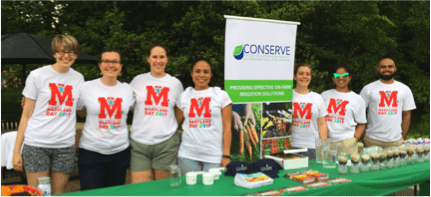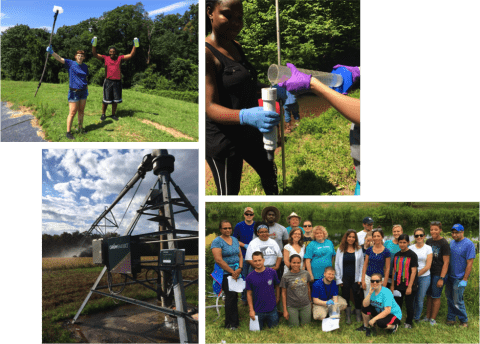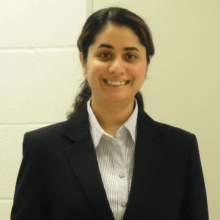Focusing on Relationships Between Microbial Exposures and Human Infectious Diseases

The Applied Environmental Microbiology and Exposure Assessment Lab within the University of Maryland School of Public Health focuses on evaluating the complex relationships between environmental microbial exposures and human infectious diseases.
Department: Global, Environmental, and Occupational Health (GEOH)
Room Number: 2234P
Director: Amy R. Sapkota
Office Phone Number: (301) 405-1772
Email: ars@umd.edu
Our fearless leader is Dr. Amy R. Sapkota, a Professor of Environmental Health within the Department of Global, Environmental, and Occupational Health (formerly the Maryland Institute for Applied Environmental Health), and the Director of CONSERVE: A Center of Excellence at the Nexus of Sustainable Water Reuse, Food and Health, funded by the U.S. Department of Agriculture, National Institute of Food and Agriculture. Our group includes undergraduate students, graduate students, post-docs and technicians.
We are always looking for talented undergraduates, graduate students and post-docs to join our group. Please explore our site, and if our group may be a good fit for your interests, please contact Dr. Sapkota at ars@umd.edu.
Laboratory Capacity
Our laboratories are fully equipped for processing and analyzing large numbers of environmental and human clinical samples with regard to the presence of bacterial and viral pathogens, as well as total bacterial and vrial diversity (using both culture-based techniques and sophisticated culture-independent, next-generation sequencing methods). Specifically, our laboratories include a 1000 ft2 biosafety level II environmental microbiology and molecular biology laboratory, a 500 ft2 biosafety level two field laboratory, and a 500 ft2 biosafety level two post-polymerase chain reaction (PCR) laboratory. Major items of equipment available in these labs include: 1 Beckman Coulter high-capacity centrifuge; refrigerated microcentrifuges; 2 Baker SterilGARDIII Advance biological safety cabinets; 2 chemical fume hoods; 1 NanoDrop ND-1000 spectrophotometer; 1 MP Biomedicals FastPrep bead beater; 2 Sensititre autoinoculators; multiple deli-style refrigerators; 6 -20°C freezers; 4 -80°C freezers; 2 environmental chambers; and 8 incubators. In addition to these items, the following pieces of equipment are also housed in our laboratories: air sampling equipment; a membrane filtration system; conventional and real-time thermocyclers; gel electrophoresis units and power supplies; a gel documentation system; a rotisserie hybridization oven; an ultraviolet light crosslinker; water baths and small table top instruments. A glassware, media and autoclave facility is located next to these laboratories.
DAWN: Dashboard for Agricultural Water Use and Nutrient Management
Investigators: Xin-Zhong Liang (Principal Investigator). A.R. Sapkota (Co-Principal Investigator).
Funder: U.S. Department of Agriculture, National Institute of Food and Agriculture.
Total Costs: $10,000,000
Funding Period: 2020-2025
The plan is to develop a Dashboard for Agricultural Water use and Nutrient management (DAWN) that will help maximize corn, soybean and bioenergy crop production in the Midwestern United States. DAWN is expected to identify innovative ways of increasing land- and water-use efficiency given competing resource demands and varying water availability and quality. Read the press release for more information on this grant award.
UMD Global STEWARDS: STEM Training at the Nexus of Energy, Water Reuse and Food Systems
Investigator: Amy R. Sapkota (Principal Investigator).
Funder: National Research Traineeship (NRT) program funded by the National Science Foundation.
Total Costs: $3,000,000
Funding Period: 2018-2023
The UMD Global STEWARDS graduate training fellowship, funded by the National Science Foundation Research Traineeship (NRT) program, is preparing future leaders focused on innovations at the nexus of food, energy and water (FEW) systems. UMD Global STEWARDS focus on a range of topics in three integrated FEW nexus research areas: Agriculture resilience through energy-efficient water reuse, Food safety and security in variable climate scenarios, and Decision support systems to advance food-energy-water adaptation strategies. The program is preparing PhD students from UMD programs in the life and public health sciences, earth system sciences, engineering and computational sciences, social behavioral sciences, natural resource management studies, energy and environmental policy, and other FEW-related programs through hands-on domestic and international experiences, as well as research, professional development, and outreach opportunities. Find more information on the Global Stewards website.
CONSERVE: A Center of Excellence at the Nexus of Sustainable Water Reuse, Food & Health
Investigator: Amy R. Sapkota (Principal Investigator).
Funder: U.S. Department of Agriculture, National Institute of Food and Agriculture.
Total Costs: $10,000,000
Funding Period: 2016-2021
CONSERVE Overview: Climate variability is placing severe stress on high-quality agricultural irrigation sources such as groundwater. As a result, water reuse and exploring nontraditional irrigation water sources (e.g., reclaimed water) have become national priorities for agricultural water security and the sustainable production of our food supply. At the same time, the recent Food Safety Modernization Act is shifting the focus of food safety from responding to foodborne contamination to preventing it. This places great responsibility on agricultural producers, who must meet stricter guidelines for the quality of irrigation water used on food crops. This presents a significant new gap: new sustainable on-farm solutions are needed so that agricultural producers can conserve groundwater through the safe use of nontraditional irrigation water sources.
We are addressing this need through CONSERVE (COordinating NontraditionalSustainable watER Use in Variable climatEs): A Center of Excellence at the Nexus of Sustainable Water Reuse, Food, and Health. CONSERVE research, extension and education activities are developed by a leading team of bioscientists, engineers, economists, social-behavioral scientists, law and policy experts, extension specialists, educational media developers and computer scientists. We extend our findings to stakeholders, including farmers, communities, educators, students, and federal, state, and local governments through outreach and engagement. CONSERVE is focusing on two key regions, the Mid-Atlantic and Southwest, thereby highlighting two diverse climates that are in different stages of need for nontraditional irrigation. Specifically, the Mid-Atlantic is currently not experiencing serious water shortages, and the integration of new on-farm water treatment technologies at this time represents a proactive approach to climate change. In contrast, the Southwest region is experiencing severe water shortage crises, and thereby represents a need for reactive solutions to climate change. Through our innovative efforts, we will facilitate the adoption of transformative on‐farm solutions that enable the safe use of nontraditional irrigation water on food crops and effectively reduce the nation’s agricultural water challenges that are exacerbated by climate change. Find more information on the CONSERVE website.
Rapid Response Characterization of New and Manipulated Tobacco Products (P50 Center, P50CA180523)
Investigators: P. Clark (PI). R01 within P50 Center, “Exploring tobacco microbial constituents and the oral microbiome of tobacco users.” A.R. Sapkota, E.F. Mongodin (Co-PIs)
Funder: Food and Drug Administration, and National Institutes of Health/National Cancer Institute
Total Costs: $20,000,000 (Overall Center), $2,700,00 (R01)
Funding Period: 2013-2018
Project Overview: Novel research is needed to improve our understanding of the microbial constituents of tobacco products, and their associated adverse health effects. Research conducted over the past 50 years has provided a firm knowledge base regarding the chemical and physical composition of smokeless tobacco products, smoked tobacco products and cigarette smoke. However, there is a paucity of data regarding the microbial constituents of these products and their impacts on public health. A limited number of microorganisms have been characterized in previous studies, due to the use of traditional culture-based methods. Thus, our long-term goal is to harness the power of next-generation sequencing technologies to comprehensively characterize 1) the bacterial flora of a range of conventional, new and manipulated tobacco products and smoke; 2) the influence of specific groups of bacteria on the production of tobacco-specific N-nitrosamines (TSNAs); and 3) the impacts of tobacco bacterial flora on the oral microbiome of tobacco users. The central hypothesis of our project is that tobacco products are characterized by bacterial populations that may influence not only the chemical constituents of tobacco products, but also the health of tobacco users. Our rationale for exploring this hypothesis is that, to our knowledge, no studies have comprehensively characterized the microbial diversity of tobacco products and their subsequent public health effects. As a result, there is a critical knowledge gap with regard to 1) the diversity of tobacco microbial constituents; and 2) whether these constituents should be regulated by FDA. Our specific aims address these critical issues: Aim 1: To explore the bacterial microbiome of conventional, new and manipulated smoked and smokeless tobacco products and smoke, and examine the role of specific genera in TSNA production; Aim 2: To provide novel, baseline data on the composition of the oral microbiome and its associated expressed activities in smokers and smokeless tobacco users compared with that of non-users; Aim 3: To characterize the transient changes--bacterial community composition and expressed metabolic activities--in the oral microbiome after single-use of new and manipulated smoked and smokeless tobacco products. The novel science generated in this study is directly relevant to the Family Smoking Prevention and Tobacco Control Act because it can be used immediately to inform potential new microbial-related tobacco regulations that have never before been considered despite the reality that the microbiology of tobacco has been of interest to the tobacco industry for the past 60 years. Find more information the University of Maryland/Battelle Tobacco Center of Regulatory Science website.
Dr. Sapkota is the Director of CONSERVE: A Center of Excellence at the Nexus of Sustainable Water Reuse, Food & Health, a multi-institution Center funded by the U.S. Department of Agriculture, National Institute of Food and Agriculture (2016-2020). She is also the Principal Investigator of UMD Global STEWARDS (STEM Training at the Nexus of Energy, Water Reuse and Food Systems), a National Research Traineeship (NRT) program funded by the National Science Foundation (2018-2023). The mission of CONSERVE is to facilitate the adoption of transformative on‐farm water treatment solutions that enable the safe use of nontraditional irrigation water (e.g. reclaimed water, return flows) on food crops. And the overarching goal of the UMD Global STEWARDS program is for graduate trainees to become adept at working and communicating across food-energy-water (FEW) disciplines, enabling transformative discoveries that can only be realized through transdisciplinary approaches and systems-based thinking.
Dr. Sapkota received a PhD in Environmental Health Sciences from the Johns Hopkins Bloomberg School of Public Health, and an MPH in Environmental Health Sciences from the Yale School of Public Health. After completing her doctorate, she engaged in post-doctoral fellowships at the Johns Hopkins Bloomberg School of Public Health and the Environmental Microbial Genomics Group at Ecole Centrale de Lyon in Lyon, France.
She is the recipient of the 2012 Eric Mood New Professional Award from the Yale School of Public Health that recognizes the career of a Yale alumnus/a who demonstrates outstanding leadership potential and creativity in the practice of public health. Dr. Sapkota is also the recipient of the 2015 Jerry P. Wrenn Outstanding Service Award and the 2018 Research and Development Award from the University of Maryland School of Public Health. In 2017, she represented the Core Fulbright U.S. Scholar Program and the United States as a Fulbright Senior Researcher in Chitwan, Nepal.
Dr. Sapkota's research interests lie in the areas of environmental microbiology, environmental microbial genomics, exposure assessment and environmental epidemiology. Her research group evaluates the complex relationships between environmental microbial exposures and human infectious diseases, with a special focus on assessing the public health impacts associated with water reuse. Much of her group's work seeks to 1) characterize the microbiome of recycled water sources, and 2) understand how direct and indirect exposures to these sources can impact the human microbiome and infectious disease risk.
Suhana Chattopadhyay is a Senior Faculty Specialist. She received her BS and MS in Botany from India. She completed her MS in Ecology from Kent State University, Ohio, and joined the University of Maryland in 2014.
(301) 405-5559
suhanac@umd.edu
School of Public Health Rm. 0110N
Leena Malayil is a Research Associate for CONSERVE. She successfully defended her PhD dissertation as a student in the Toxicology and Environmental Health program. She received her triple major BS (Chemistry, Zoology and Microbiology) and MS (Microbiology) in India. She also has an MS in Toxicology from the University of Georgia (2009) and recently graduated with a PhD in Toxicology and Environmental Health from the University of Maryland in 2019.
(301) 405-5559
lmalayil@umd.edu
School of Public Health Rm. 0110N
Michele Morgado is a graduate student in Environmental Health Sciences. She received her BS (Marine Biology and Fisheries) in Portugal and earned an MS in Oceanography/Coastal Zone Management from Nova Southeastern University (2007). She also attended Johns Hopkins University and received a post-master’s graduate certificate in Environmental Engineering, Science and Planning (2014). Previously, she worked as an oceanographic technician and adjunct faculty at the U.S. Naval Academy and taught Oceanography at Anne Arundel Community College.
(301) 405-5559 morgado@umd.edu
School of Public Health Rm. 0110N
Rianna Murray, is an Assistant Research Professor in GEOH and Program Manager of the UMD Global STEWARDS program. She received her BSc. with a double major in Biochemistry and Chemistry from the University of the West Indies in Trinidad & Tobago. She graduated from the University of Maryland School of Public Health in 2019 with a PhD in Toxicology and Environmental Health. She also earned her Master of Public Health degree with a concentration in Environmental Health Sciences from the University of Maryland School of Public Health in 2013. Her research interests lie in the fields of environmental health, global health, environmental justice, food safety, and water quality. Her dissertation investigated the influence of private drinking water wells and their proximity to animal agricultural operations on the incidence of foodborne illness in Maryland. Rianna's passion for global health took her to Sierra Leone in 2014 and 2016 with the UMD student-led group Public Health Without Borders, where she worked with a rural community to conduct community needs assessments and health and hygiene workshops, and investigated the impact of the 2014-2016 Ebola epidemic on the community.
(301) 405-5559 rmurray@umd.edu
School of Public Health Rm. 0110N
Former Postdoctoral Scholars:
- Sarah Allard
- Eoghan Smyth
- Kristi Shaw
- Sutyajeet Soneja
- Shirley Micallef
Former Graduate Students:
- Leena Malayil (PhD, 2019)
- Hillary Craddock (PhD, 2019)
- Jessica Chopyk (PhD, 2019)
- Rianna Murray (PhD, 2018)
- Prachi Kulkarni (PhD, 2016)
- Rhodel Bradshaw (MPH, 2017)
- Kelsey Babik (MPH, 2015 )
- Molly Reid (MPH, 2015)
- Rachel Rosenberg Goldstein (PhD, 2013)
Former Undergraduate Students
- Anthony Quang-Vinh Bui
- Emma Claye
- Shamar Rundhawa
- Robin Cagle
- Mansi Panse
- Daniella Portal
- Isabel Burick
- Jackie Taylor
Selected Publications From Our Group Within the Past Five Years
(†denotes corresponding author; § denotes shared first or senior authorship; #denotes advised undergraduate students; *denotes advised graduate students; **denotes advised, post-doctoral students)
Carey SA*, Rosenberg Goldstein RE**, Gibbs SG, Claye E, He, X, Sapkota AR†. 2016. Occurrence of vancomycin-resistant and –susceptible Enterococcus spp. in reclaimed water used for spray irrigation. Environmental Research. 147:350-355.
Shaw KS**, Cruz-Cano R, Jiang C, Malayil L, Palmer A, Blythe D, Ryan P, Sapkota AR†. 2016. Presence of animal feeding operations and community socioeconomic factors impact salmonellosis incidence rates: Foodborne diseases active surveillance network (FoodNet), 2004-2010. Environmental Research. 150:166-172.
Rosenberg Goldstein RE**, Cruz-Cano R, Jiang C, Palmer A, Blythe D, Ryan P, Hogan B, White B, Dunn JR, Libby T, Tobin-D’Angelo M, Huang J, McGuire S, Scherzinger K, Lee MLT, Sapkota AR†. 2016. Association between community socioeconomic factors, animal feeding operations and Campylobacteriosis incidence rates: Foodborne diseases active surveillance network (FoodNet), 2004-2010. BMC Infectious Diseases. 16:354.
Rosenberg Goldstein RE**, Cruz-Cano R, Jiang C, Palmer A, Blythe D, Ryan P, Hogan B, White B, Dunn JR, Libby T, Tobin-D’Angelo M, Huang J, McGuire S, Scherzinger K, Lee MLT, Sapkota AR†. 2016. Association between community socioeconomic factors, animal feeding operations and Campylobacteriosis incidence rates: Foodborne diseases active surveillance network (FoodNet), 2004-2010. BMC Infectious Diseases. 16:354.
Chopyk J*, Chattopadhyay S*, Kulkarni P*, Claye E*, Babik KR*, Reid MC*, Smyth EM**, Hittle LE, Paulson JN, Cruz-Cano R, Pop M, Clark PI, Sapkota AR§, Mongodin EF§,†. 2017. Mentholation affects the cigarette microbiota by selecting for bacteria resistant to harsh environmental conditions and selecting against potential bacterial pathogens. Microbiome. 15;5(1):22.
Chopyk J*, Chattopadhyay S, Kulkarni P*, Smyth EM**, Hittle LE, Paulson JN, Pop M, Clark PI, Mongodin EF§, Sapkota AR§,†. 2017. Temporal variations in cigarette tobacco bacterial community composition and tobacco-specific nitrosamine content are influenced by brand and storage conditions. Frontiers in Microbiology. 7(8):358.
Boyle M*, Sutyajeet S**, Quiros-Alcala L, Dalemarre L, Sapkota AR, Sangaramoorthy T, Wilson S, Miton D, Sapkota A. 2017. A pilot study to assess residential noise exposure near natural gas compressor stations. 2017. PLoSOne. 12(4): e0174310.
Rosenberg Goldstein RE**†, Kleinfelter L*, He X, Micallef SA, George A, Gibbs SG, Sapkota AR. 2017. Higher prevalence of coagulase-negative staphylococci carriage among reclaimed water spray irrigators. Science of the Total Environment. 595(1):35-40.
Rosenberg Goldstein RE**†, Kleinfelter L*, He X, Micallef SA, George A, Gibbs SG, Sapkota AR. 2017. Higher prevalence of coagulase-negative staphylococci carriage among reclaimed water spray irrigators. Science of the Total Environment. 595(1):35-40.
Smyth EM**, Kulkarni P*, Claye E*, Stanfill S, Tyx R, Mongodin EF, Sapkota AR†. 2017. Smokeless tobacco products harbor diverse bacterial communities that differ across products and brands. Applied Microbiology and Biotechnology. Jul;101(13):5391-5403.
Kulkarni P*, Olson N*, Raspanti G*, Rosenberg Goldstein R**, Gibbs SG, Sapkota A, Sapkota AR†. 2017. Antibiotic concentrations decrease during wastewater treatment but persist at low levels in reclaimed water. International Journal of Environmental Research and Public Health. Jun 21;14(6).
Huang JY, Patrick ME, Manners J, Sapkota AR, Scherzinger KJ, Tobin-D’Angelo M, Henao OL, Cole DJ, Vieira AR. 2017. Association between wetland presence and incidence of Salmonella enterica serotype Javiana infections in selected US sites, 2005-2011. Epidemiology and Infection, 145(14):2991-2997.
Chopyk J*, Allard S**, Nasko DJ**, Bui A, Mongodin EF, Sapkota AR. 2018. Agricultural freshwater pond supports diverse and dynamic bacterial and viral populations. Frontiers in Microbiology.
Kulkarni P**, Olson ND*, Paulson JN, Pop M, Maddox C, Claye E, Rosenberg Goldstein RE, Sharma M, Gibbs SG, Mongodin EF, Sapkota AR†. 2018. Conventional wastewater treatment and reuse site practices modify bacterial community structure but do not eliminate some opportunistic pathogens in reclaimed water. Science of the Total Environment.
Murray R, Rosenberg Goldstein R, Maring E, Pee D, Aspinwall K, Wilson S, Sapkota A. Prevalence of Microbiological and Chemical Contaminants in Private Drinking Water Wells in Maryland, USA. International Journal of Environmental Research and Public Health. 2018;15(8):1686. doi:10.3390/ijerph15081686
Sapkota AR†. 2019. Water reuse, food production and public health: Adopting transdisciplinary, systems-based approaches to achieve water and food security in a changing climate. Environmental Research, 171, 576-580. doi: 10.1016/j.envres.2018.11.003.
Zhu L*, Torres M, Betancourt WQ, Sharma M, Micallef SA, Gerba C, Sapkota AR, Sapkota A, Parveen S, Hashem F, May E, Kniel-Tolbert KE, Pop M, Ravishankar S. 2019. Incidence of fecal indicator and pathogenic bacteria in reclaimed and return flow waters in Arizona, USA. Environmental Research, 170, 122-127. doi: 10.1016/j.envres.2018.11.048.
Chattopadhyay S*, Smyth EM**, Hittle LE, Clark P, Mongodin EF, Sapkota AR†. 2019. Little cigars and cigarillos harbor diverse bacterial communities that differ between the tobacco and the wrapper. PLoSONE, 14(2):e0211705. doi: 10.1371/journal.pone.0211705.
Kulkarni P*, Raspanti GA**, Bui AQ*, Bradshaw RN*, Kniel K, Chiu P, Sharma M, Sapkota A, Sapkota AR†. 2019. Zerovalent iron-sand filtration can reduce the concentration of multiple antimicrobials in conventionally treated reclaimed water. Environmental Research, 172, 301-309. doi: 10.1016/j.envres.2019.02.012.
Allard SM**, Callahan MT, Bui A*, Ferelli A*, Chopyk J*, Chattopadhyay S*, Mongodin EF, Micallef SA, Sapkota AR†. 2019. Creek to Table: Tracking fecal indicator bacteria, bacterial pathogens, and total bacterial communities from irrigation water to kale and radish crops. Science of the Total Environment, 666, 461-471. doi: 10.1016/j.scitotenv.2019.02.179.
Allard S**, Solaiman S*, Callahan MT*, Bui A, Kelbick HC*, Haymaker J*, Foust D*, Duncan R*, Smyth E**, Mongodin EF, Hashem F, Micallef S, Sapkota AR†. 2019. Quenching by sodium thiosulfate does not influence 16S rRNA gene sequencing profiles of reclaimed water from three sites in the Mid-Atlantic, United States. Environmental Research, 172:296-300. doi: 10.1016/j.envres.2019.02.022.
Haymaker J*, Sharma M, Parveen S, Hashem F, May E, Handy E, White C, East C, Bradshaw R*, Micallef SA, Callahan MT, Allard SM**, Anderson B*, Craighead S*, Gartley S*, Vanore A*, Kniel KE, Solaiman S*, Bui A, Murray R*, Craddock HA*, Kulkarni P**, Foust D*, Duncan R*, Taabodi M, and Sapkota AR. 2019. Prevalence of Shiga toxin-producing and atypical enteropathogenic Escherichia coli in untreated surface water and reclaimed water in the Mid-Atlantic U.S. Environmental Research, 172:630-636. doi: 10.1016/j.envres.2019.02.019.
Hosgood D, Mongodin EF, Wan Y, Hua X, Rothman N, Hu W, Vermeulen R, Seow WJ, Rohan T, Xu J, Li J, He J, Huang Y, Yang K, Wu G, Wei F, Shi J, Sapkota AR, Lan Q. 2019. Respiratory tract microbiome and its relationship to lung cancer and environmental exposures found in rural China. Environmental and Molecular Mutagenesis. [In press].
Chopyk J, Kulkarni P**, Nasko DJ**, Bradshaw R*, Kniel KE, Chiu P, Sharma M, Sapkota AR†. 2019. Zero-valent iron sand filtration reduces concentrations of virus-like particles and modifies virome community composition in reclaimed water used for agricultural irrigation. BMC Research Notes 12 (1) 223.
Panthi S, Sapkota AR, Raspanti G, Allard S, Bui A, Craddock H, Murray R, Zhu L, East C, Handy E, Callahan MT, Haymaker J, Kulkarni P, Anderson B, Craighead S, Gartley S, Vanore A, Betancourt WQ, Duncan R, Foust D, Sharma M, Micallef SA, Gerba C, Parveen S, Hashem F, May E, Kniel K, Pop M, Ravishankar S, and Sapkota A. 2019. Pharmaceuticals, herbicides and disinfectants in agricultural water sources. Environmental Research [In press].
Smyth EM, Chattopadhyay S, Chopyk J, Malayil L, Kulkarni P, Hittle LE, Clark PI, Sapkota AR Mongodin EF. 2019. The bacterial communities of little cigars and cigarillos are dynamic over time and varying storage conditions. Frontiers in Microbiology 10: 2371.
Chopyk J, Nasko DJ, Allard S, Bui A, Treangen T, Pop M, Mongodin EF, Sapkota AR†. 2020 Comparative metagenomic analysis of microbial taxonomic and functional variations in untreated surface and reclaimed waters used in irrigation applications. Water Research, 169:115250.
Chopyk J, Nasko CJ, Allard S, Callahan MT, Bui A, Ferelli AMC, Chattopadhyay S, Mongodin EF, Pop M, Micallef S, Sapkota AR†. 2020. Metagenomic analysis of bacterial and viral assemblages from a freshwater creek and irrigated field reveals temporal and spatial dynamics. Science of the Total Environment, 205:135395. doi: 10.1016/j.scitotenv.2019.135395.
Craddock HA, Panthi S, Rjoub Y, Lipchin C, Sapkota A, Sapkota AR†. 2020. Antibiotic and herbicide concentrations in household greywater reuse systems and pond water used for food crop irrigation: West Bank, Palestinian Territories. Science of the Total Environment, 699:134205.
Malayil L, Chattopadhyay S, Kulkarni P, Hittle LE, Clark P, Mongodin EF, Sapkota AR. 2020. Mentholation triggers brand-specific shifts in the bacterial microbiota of commercial cigarette products. Applied Microbiology and Biotechnology, 1-11.
Murray, R.T., Cruz-Cano, R., Nasko, D., Blythe, D., Ryan, P., Boyle, M., Wilson, S.M., Sapkota, A.R. (2020). Association between Private Drinking Water Wells and the Incidence of Campylobacteriosis in Maryland: An Ecological Analysis Using Foodborne Diseases Active Surveillance Network (FoodNet) Data (2007-2016). Environmental Research, 188:109773.
Craddock HA, Chattopadhyay S, Rjoub Y, Rosen D, Greif J, Lipchin C, Mongodin EF, Sapkota AR. 2020. Antibiotic-resistant in greywater reuse systems and pond water used for agricultural irrigation in the West Bank, Palestinian Territories. Environmental Research.
Kulkarni P, Olson ND, Bui AQ, et al. Zero-Valent Iron Sand Filtration Can Reduce Human and Plant Pathogenic Bacteria While Increasing Plant Growth Promoting Bacteria in Reclaimed Water. Frontiers in Environmental Science. 2020;8:203. doi:10.3389/fenvs.2020.541921
Chopyk, J., Nasko, D.J., Allard, S. et al. Seasonal dynamics in taxonomy and function within bacterial and viral metagenomic assemblages recovered from a freshwater agricultural pond. Environmental Microbiome 15, 18 (2020).
Fall 2020
Rianna Murray got promoted to Assistant Research Professor in MIAEH.
Jessica Chopyk published a paper in Environmental Microbiome.
Prachi Kulkarni published a paper in Frontiers in Environmental Science.




